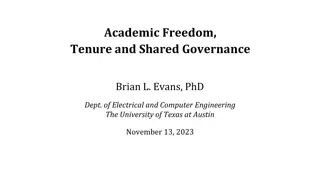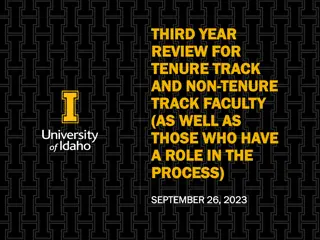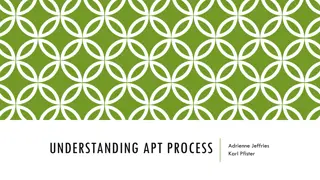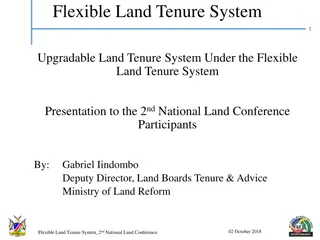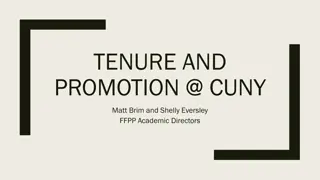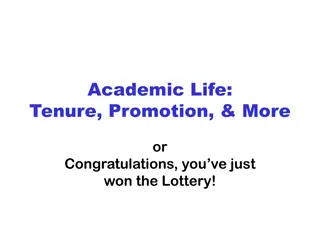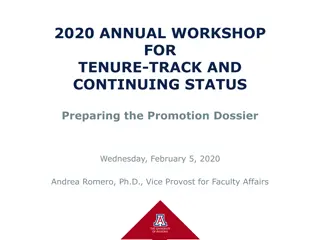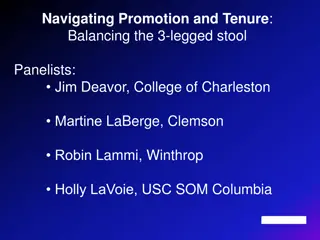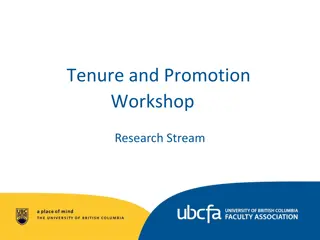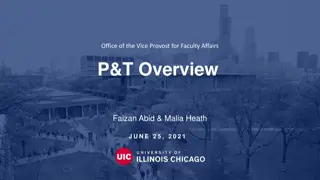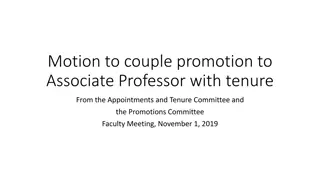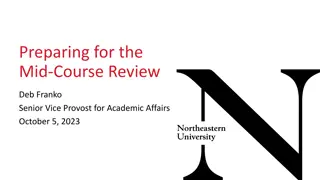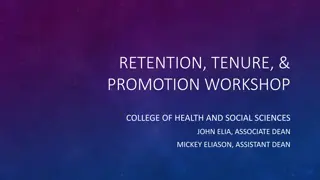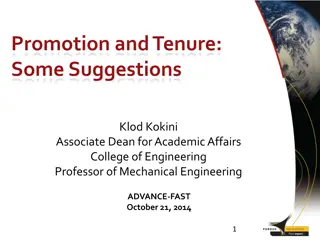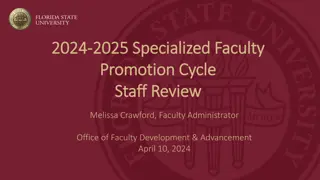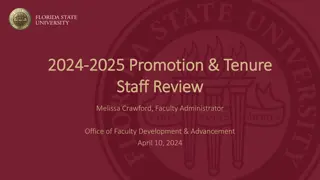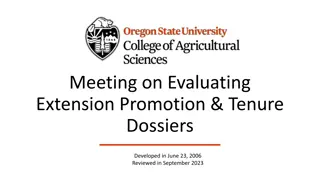Promotion and Tenure Seminar 2023
Learn about academic tracks, promotion criteria, and expectations for successful promotion & tenure. Explore diverse pathways!
Download Presentation

Please find below an Image/Link to download the presentation.
The content on the website is provided AS IS for your information and personal use only. It may not be sold, licensed, or shared on other websites without obtaining consent from the author. Download presentation by click this link. If you encounter any issues during the download, it is possible that the publisher has removed the file from their server.
E N D
Presentation Transcript
Kevin A. Morano, Ph.D. Professor, Microbiology & Molecular Genetics Senior Associate Dean for Faculty Affairs, McGovern Medical School Senior Vice President of Academic and Faculty Affairs Johnson George, MBA Assistant Dean, Office of Administration and Faculty Affairs
Location The Office of Administration and Faculty Affairs - MSB G.150
Office of Administration and Faculty Affairs Johnson George, MBA Assistant Dean 713-500-5101 Johnson.George@uth.tmc.edu Tina Clark Executive Services Administrator 713-500-5103 Tasamania.D.Clark@uth.tmc.edu
I. Academic Tracks Clinical, non-tenure track Research, non-tenure track Instructional, non-tenure track Tenure track Clinician/Educator pathway Scientist/Educator pathway
Ranks, Tracks, and Pathways to Promotion and/or Tenure *Minimum of 3 years in rank is required for promotion (HOOP); however, less than 5 years at time of submission is considered accelerated. ** Requested by faculty member and approved by Dept. Chair and Dean, effective 9/1. Time off the tenure track does not count toward the 9-year tenure probationary period. (tenure must be awarded before 9thyear)
Comparison of Promotion on the Tenure and Non-Tenure Tracks Tenure Track Non-Tenure Track Department letters Department letters Dean s letters Must show a national or international reputation for focused scholarship; must be original, directed work Must show a local/regional reputation in a focused area; need not be fully independent work May have a narrower contribution to university (e.g., less teaching, committee service or research) Requires a broader contribution to university (e.g., in more areas of endeavor)
Expectations Planning for Promotion and Tenure
Qualifying for Promotion: Clinical Activities Clinical service is highly valued for its role in education and discovery Volume, quality and impact Quality improvement projects Developing or expanding clinical programs Innovation in techniques, instrumentation, procedures Leadership in the clinical setting
Qualifying for Promotion: Scholarly Activities Evidence of scholarly activity can be in many forms, e.g., peer- publications, invited articles, awards and honors, participation on grants, patents issued/licensed, etc. Presentations, case studies, speaking invitations In general, the scholarly activity must be documentableand must demonstrate some impact on the candidate s field. Disseminated/adopted QI programs
Qualifying for Promotion: Teaching Activities Many types of teaching/educational activities Didactic, classroom teaching PBL/TBL One-on-one mentoring/training of undergraduates, graduate students (MS/PhD), medical students, postdocs, residents, fellows Loosely interpreted rounds, workshops, M&M discussions Teaching effectiveness, evaluation and assessment should be included in Chair s letter of nomination Patient/community outreach and education Leadership in educational activities (PD, APD)
Qualifying for Promotion: Service/Admin Activities Administrative activity is important to the institution, but it is rarely by itself the basis for promotion. Expected of all faculty at some level. Committee work: division, department, school, university, hospital, society Grant/guideline/paper reviewing Leadership/admin examples: division director, vice chair, etc. Leadership roles important for promotion to senior ranks.
NTC Promotion Criteria Four Domains of Achievement Clinical/Patient Care Research/Scholarship Education Service/Administration Activity in any domain that only meets basic employment expectations will be described as Acceptable and will not contribute toward consideration for promotion. Performance above and beyond this level will be described asCommendable and will count toward promotion. A second level of extraordinarily high performance will be described as Exceptional. Quantitatively, these levels of achievement will be given point values of 0, 1 and 2, respectively.
NTC Promotion Criteria For promotion to Associate Professor 1. Exceptional (2) in at least one domain. 2. At least a 1 in clinical. 3. Total of 4 points. For promotion to Professor 1. Exceptional (2) in at least two domains. 2. At least a 1 in clinical. 3. Total of 5 points. Chair s letter and faculty narrative will build the case for proposed achievement levels and areas of focus
NTC Promotion Criteria Example A: An innovative clinician with high clinical productivity and quality, significant committee service and activity in resident education with little to no published research seeking promotion to Associate Professor might claim Clinical: 2, Service: 1, Education: 1. Example B: A strong clinician with moderate clinical productivity and quality, multi-year appointment as Medical Director, and several published research papers or quality project reports seeking promotion to Associate Professor might claim Clinical: 1, Service: 2, Research: 1. Example C: An innovative clinician with high clinical productivity and quality, bedside supervision of multiple trainees and additional didactic teaching, multi-year appointment as Residency Director, several case studies and one or two peer-reviewed publications and a strong record of hospital committee service, seeking promotion to Professor might claim Clinical: 2, Education: 2, Research: 1, Service: 1. Example D: A strong clinician with moderate clinical productivity and quality, little to no exposure to trainees, no publications and service on several committees in the last five years would be scored Clinical: 1, Education: 0, Research: 0, Service: 1, and would not yet be competitive for promotion. (This last case may also represent a faculty better suited to move to a Staff Physician appointment).
Qualifying for Promotion: Peer Esteem Reflects regional, national, international reputation Clinical referrals, invited seminars/talks/meeting presentations Grant review, journal review, invited reviews and book chapters Overlaps with scholarship Takes time and effort
Strategies for Getting Known Outside Your Institution ** Publish and present your work** Join professional societies, go to meetings Correspond with people whose work interests you Agree to review grants, journal articles Speak to the media, local and national organizations Join large (national) collaborative research studies
II. Readiness for Promotion Purpose of the Annual Faculty Review determine if the candidate is on track for promotion give guidance and plan for the upcoming year. The Department (Internal) Review Committee reviews the candidate s credentials with CV and 3 internal reference letters. advises the Department Chair regarding the candidate s promotion. OAFA can review a candidate s CV (in the UT format) in advance. Assistant Dean Johnson George will hold a 30 min. consultation session (Individual Promotion Plan; IPP) upon request with updated CV
The Parts of Your Promotion Package The Chair s letter of nomination CV in UT format Promotion Narrative (required) Letters of support (3) from colleagues within UTHealth but outside your department List of 6 external references outside UTHealth* ( Department letters ) Tenure track only: Faculty Affairs obtains references and letters from an additional 6 colleagues ( Dean s letters ), who are nominated by those on your external reference list
Rules for External Letters For all candidates at least 3 of the 6 external references submitted by the department should be from individuals outside of Houston who did not have personal contact with the candidate during training. External letters must be from various institutions outside of UTHealth. Tenure track: national/international peer esteem Non-tenure track: regional/state peer esteem External referees should be peers who know the candidate through professional accomplishments and not from a personal relationship
Time Table May 1 to August 31 Department (Internal) Review Committee reviews recommendations September 1 - Proposals due to the Dean, c/o OAFA March/April - Health Science Center - University Appointments, Promotions and Tenure Committee meets May/June - Health Science Center report due in Austin August - Board of Regents meet (re: tenure actions) September 1 - Promotion and/or Tenure becomes effective
Role and Philosophy of the FAPTC Advisory to the Dean Gatekeepers Quality of the faculty Reputation and future of the institution
Review Process by the FAPTC For promotion to Associate Professor: Primary and secondary FAPTC reviewers assigned Reviewers present dossier at FAPTC meeting with recommendations FAPTC discusses and votes on recommendation, which is forwarded to the Dean
Review Process by the FAPTC For promotion to Professor: Ad hoc committee of 3 professors (FAPTC member as Chair and 2 MMS Professors) Ad hoc committee reviews the dossier and prepares a report to FAPTC The ad hoc committee chair presents the report at FAPTC meeting with recommendation After discussion, the FAPTC votes on recommendation, which is forwarded to the Dean.
Deans Actions Dean reviews the FAPTC recommendations and decides to endorse or not endorse them The Dean notifies the candidate s Department Chair of his decision A copy of this letter is provided to the candidate
UTHealth Actions The endorsed tenure track dossiers are forwarded to the EVP/CAO and then President for the University Appointments, Promotions and Tenure Committee (UAPTC). The outcome of the UAPTC action is conveyed to the Dean, who notifies the candidate via the Department Chair.
Take Away Messages Seek Help! OAFA, Chair, Vice Chairs/Development, Senior Colleagues Know what is expected of you Actively guide your career path Assess your readiness for promotion Make a timeline Decide how best to direct your efforts in the time you have Revisit your plan and make mid-course corrections as needed Document your achievements carefully Seek professional visibility Be flexible!
Need A Hand? Office of Administration and Faculty Affairs 713-500-5103 MSB G.150 Consultation Information Assistance Tina Clark







